Plato
柏拉图(Plato,Πλατών, 公元前427年—公元前347年),是古希腊伟大的哲学家,也是整个西方文化中最伟大的哲学家和思想家之一。 柏拉图和老师苏格拉底,学生亚里士多德并称为希腊三贤。他创造或发展的概念包括:柏拉图思想、柏拉图主义、柏拉图式爱情等。柏拉图的主要作品为对话录,其中绝大部分都有苏格拉底出场。但学术界普遍认为,其中的苏格拉底形象并不完全是历史上真实存在的苏格拉底。

The Republic(《理想国》)
1人今日阅读
本书以正义范畴为讨论的中心,以对话体的形式,谈及了道德、教育、专政、民主、独裁、共产、文艺、宗教以及男女平权等问题。
1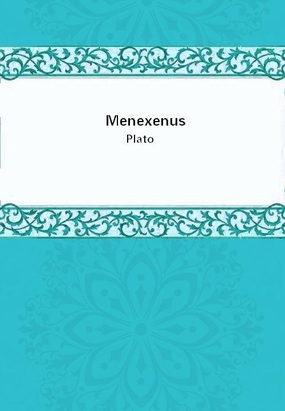
Menexenus
本书为公版书,为不受著作权法限制的作家、艺术家及其它人士发布的作品,供广大读者阅读交流。汇聚授权电子版权。

Laches
本书为公版书,为不受著作权法限制的作家、艺术家及其它人士发布的作品,供广大读者阅读交流。汇聚授权电子版权。

Lesser Hippias
本书为公版书,为不受著作权法限制的作家、艺术家及其它人士发布的作品,供广大读者阅读交流。汇聚授权电子版权。
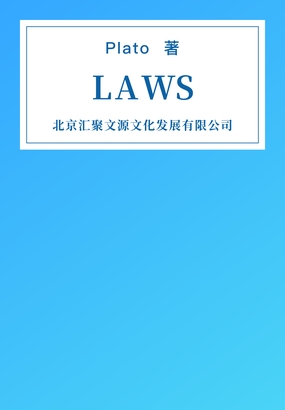
LAWS
本书为公版书,为不受著作权法限制的作家、艺术家及其它人士发布的作品,供广大读者阅读交流。汇聚授权电子版权。

LYSIS
本书为公版书,为不受著作权法限制的作家、艺术家及其它人士发布的作品,供广大读者阅读交流。汇聚授权电子版权。
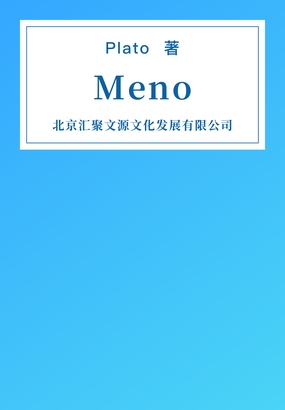
Meno
本书为公版书,为不受著作权法限制的作家、艺术家及其它人士发布的作品,供广大读者阅读交流。汇聚授权电子版权。
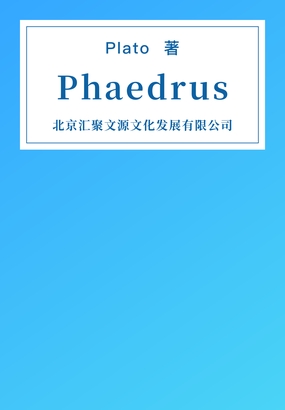
Phaedrus
本书为公版书,为不受著作权法限制的作家、艺术家及其它人士发布的作品,供广大读者阅读交流。汇聚授权电子版权。

Philebus
本书为公版书,为不受著作权法限制的作家、艺术家及其它人士发布的作品,供广大读者阅读交流。汇聚授权电子版权。
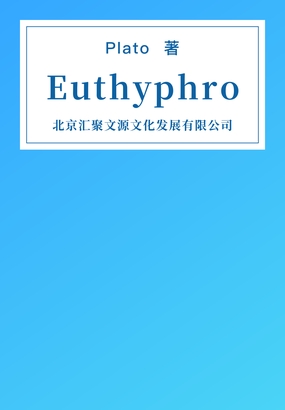
Euthyphro
本书为公版书,为不受著作权法限制的作家、艺术家及其它人士发布的作品,供广大读者阅读交流。汇聚授权电子版权。

PROTAGORAS
本书为公版书,为不受著作权法限制的作家、艺术家及其它人士发布的作品,供广大读者阅读交流。汇聚授权电子版权。
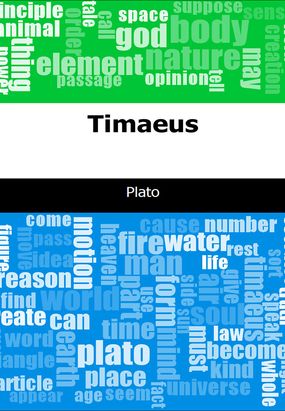
Timaeus
"Timaeus" by Plato is a philosophical discussion between Socrates, Timeaus of Locri, Hermocrates and Critias.

Ion
暂无简介

Cratylus
暂无简介
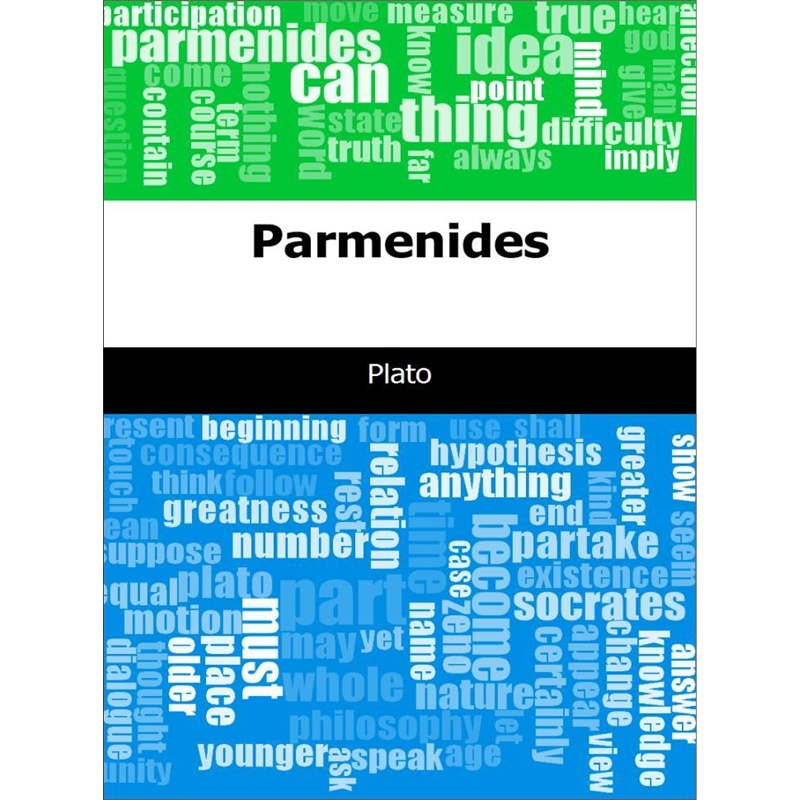
Parmenides
暂无简介

The Being of the Beautiful
"The Being of the Beautiful" collects Plato's three dialogues, the "Theaetetus," "Sophist," and "Statesmen," in which Socrates formulates his conception of philosophy while preparing for trial. Renowned classicist Seth Benardete's careful translations clearly illuminate the dramatic and philosophical unity of these dialogues and highlight Plato's subtle interplay of language and structure. Extensive notes and commentaries, furthermore, underscore the trilogy's motifs and relationships. "The translations are masterpieces of literalness. . . . They are honest, accurate, and give the reader a wonderful sense of the Greek."--Drew A. Hyland, "Review of Metaphysics"

Six Great Dialogues
Plato's 4th-century BC Dialogues rank among Western civilization's most important and influential philosophical works. With Socrates as the central disputant in a series of arguments, they probe a broad range of enduringly relevant issues. All 6 of these works feature authoritative translations by the distinguished classical scholar Benjamin Jowett.

Plato's Dialogue on Friendship
暂无简介

Respublica
This is the first edition of Plato's Republic to be based on an exhaustive examination of all the textual evidence - manuscripts, including papyri; quotations and allusions in ancient authors; translations into Coptic, Arabic and Hebrew. The three primary manuscripts have been examined with particular care. Many new readings have been introduced in the text and a critical apparatus gives details for all relevant textual evidence.

Theatetus
Set immediately prior to the trial and execution of Socrates in 399 BC, Theaetetus shows the great philosopher considering the nature of knowledge itself, in a debate with the geometrician Theodorus and his young follower Theaetetus. Their dialogue covers many questions, such as: is knowledge purely subjective, composed of the ever-changing flow of impressions we receive from the outside world? Is it better thought of as true belief'? Or is it, as many modern philosophers argue, justified true belief', in which the belief is supported by argument or evidence? With skill and eloquence, Socrates guides the debate, drawing out the implications of these theories and subjecting them to merciless and mesmerising criticism. One of the founding works of epistemology, this profound discussion of the problem of knowledge continues to intrigue and inspire.

The Last Days of Socrates
暂无简介

The Republic Of Plato: Second Edition 英文原版
Long regarded as the most accurate rendering of Platos Republic that has yet been published, this widely acclaimed work is the first strictly literal translation of a timeless classic. This second edition includes a new introduction by Professor Bloom, whose careful translation and interpretation of The Republic was first published in 1968. In addition to the corrected text itself there is also a rich and valuable essayas well as indexeswhich will better enable the reader to approach the heart of Platos intention.
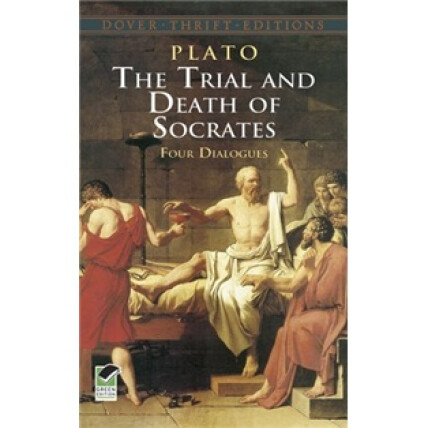
The Trial and Death of Socrates: Four Dialogues[苏格拉底的审判和处死]
Among the most important and influential philosophical works in Western thought: Euthyphro, exploring the concepts and aims of piety and religion; Apology, a defense of the integrity of Socrates' teachings; Crito, exploring Socrates' refusal to flee his death sentence; and Phaedo, in which Socrates embraces death and discusses the immortality of the soul.

Dialogues of Plato
The 18th century was a wealth of knowledge, exploration and rapidly growing technology and expanding record-keeping made possible by advances in the printing press. In its determination to preserve the century of revolution, Gale initiated a revolution of its own: digitization of epic proportions to preserve these invaluable works in the largest archive of its kind. Now for the first time these high-quality digital copies of original 18th century manuscripts are available in print, making them highly accessible to libraries, undergraduate students, and independent scholars.Western literary study flows out of eighteenth-century works by Alexander Pope, Daniel Defoe, Henry Fielding, Frances Burney, Denis Diderot, Johann Gottfried Herder, Johann Wolfgang von Goethe, and others. Experience the birth of the modern novel, or compare the development of language using dictionaries and grammar discourses. ++++The below data was compiled from various identification fields in the bibliographic record of this title. This data is provided as an additional tool in helping to insure edition identification:++++ sourceLibrary British Library ESTCID T132440 Notes Translated by Floyer Sydenham. Vol. 1 is dated 1767, vol. 2 dated 1773, and has the imprint: "printed for the author", vol. 3 1779, and with the same imprint. This eccentric three-volume set comprises publications which were separately published at vari imprintFull London : printed for W. Sandby, 1767-79. collation 3v. ; 4°

Cursed by a Happy Childhood
Harmony. PAPERBACK. Condition: New. 0307336212 Brand new.

A Greek Prose Course
暂无简介

Republic (Penguin Classics)[理想国] 英文原版
An authoritative new translation of Plato's foundational work of Western philosophy The Republic is Plato's masterwork. It was written 2,400 years ago and remains one of the most widely read books in the world, famous for both the richness of its ideas and the virtuosity of its writing. Presented as a dialogue between Plato's teacher Socrates and various interlocutors, it is an exhortation to study philosophy, inviting its readers to reflect on the choices we must make if we are to live the best life available to us. This complex, dynamic work creates a picture of an ideal society governed not money, power, or fame, but by philosophy, wisdom, and justice. 《理想国》涉及柏拉图思想体系的各个方面,包括哲学、伦理、教育、文艺、政治等内容,主要是探讨理想国家的问题。 《理想国》一书是柏拉图的一篇重要对话录,对话录里柏拉图以苏格拉底之口通过与其他人对话的方式设计了一个真、善、美相统一的政体,即可以达到公正的理想国。柏拉图的理想国是人类历史上最早的乌托邦。在他的理想国里统治者必须是哲学家,他认为现存的政治都是坏的,人类的真正出路在于哲学家掌握政权,也只有真正的哲学家才能拯救当时城邦所处的危机。这种信念构成了柏拉图成熟的政治哲学体系的核心。在他的眼里“哲学家”有着特殊的内涵。他认为哲学家是最高尚、最有学识的人,而这种贤人统治下的贤人政体就是最好是政体。所以,只有建立以哲学家为国王的国家才是最理想的国家。这个国家就是存在于天上的模范国家。
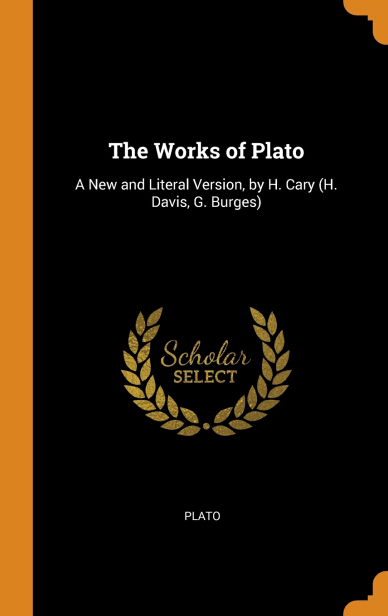
The Works of Plato
This work has been selected by scholars as being culturally important and is part of the knowledge base of civilization as we know it.This work is in the public domain in the United States of America, and possibly other nations. Within the United States, you may freely copy and distribute this work, as no entity (individual or corporate) has a copyright on the body of the work.Scholars believe, and we concur, that this work is important enough to be preserved, reproduced, and made generally available to the public. To ensure a quality reading experience, this work has been proofread and republished using a format that seamlessly blends the original graphical elements with text in an easy-to-read typeface.We appreciate your support of the preservation process, and thank you for being an important part of keeping this knowledge alive and relevant.
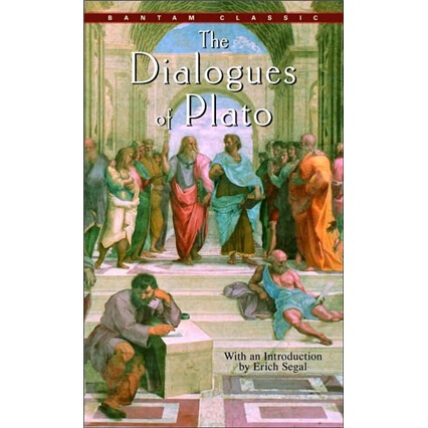
Bantam Classics 经典系列:柏拉图对话 英文原版 经典名著 The Dialogues of Plato
In these influential dialogues—Euthyphro, Apology, Crito, Meno, Phaedo, Symposium—Plato employs the dialectic method to examine the trial and death of his mentor, Socrates, and address the eternal questions of human existence. THIS ENRICHED CLASSIC EDITION INCLUDES: ·A concise introduction that gives the reader important background information · A chronology of the author's life and work · A timeline of significant events that provides the book's historical context · An outline of key themes and plot points to guide the reader's own interpretations · Detailed explanatory notes · Critical analysis and modern perspectives on the work · Discussion questions to promote lively classroom and book group interaction · A list of recommended related books and films to broaden the reader's experience Simon & Schuster Enriched Classics offer readers affordable editions of great works of literature enhanced by helpful notes and insightful commentary. The scholarship provided in Enriched Classics enables readers to appreciate, understand, and enjoy the world's finest books to their full potential.

The Dialogues of Plato; Volume 2
This work has been selected by scholars as being culturally important and is part of the knowledge base of civilization as we know it.This work is in the public domain in the United States of America, and possibly other nations. Within the United States, you may freely copy and distribute this work, as no entity (individual or corporate) has a copyright on the body of the work.Scholars believe, and we concur, that this work is important enough to be preserved, reproduced, and made generally available to the public. To ensure a quality reading experience, this work has been proofread and republished using a format that seamlessly blends the original graphical elements with text in an easy-to-read typeface.We appreciate your support of the preservation process, and thank you for being an important part of keeping this knowledge alive and relevant.

The Final Days of Socrates
The Final Days of Socrates is a book of four dialogues by Plato-Euthyphro, Apology, Crito, and Phaedo-centering, as most of Plato's dialogues do, around Socrates. These four dialogues cover the time leading up to Socrates' trial and through his death and depiction of the afterlife. Euthyphro concerns Socrates and Euthyphro, a known so-called religious expert, as they try to determine a definition for piety. Apology is Plato's version of Socrates' speech as he defends himself against the criminal charges of corrupting the youth and not believing in the same deities as the state. The Crito is a dialogue between Socrates and a friend about justice, injustice, and the reaction to injustice. Finally Phaedo, one of Plato's most famous Socratic dialogues, depicts the death of Socrates and his argument for the existence of an afterlife. All four works are also included in the Cosimo omnibus editions of The Works of Plato.One of the greatest Western philosophers who ever lived, PLATO (c. 428-347 B.C.) was a student of Socrates and teacher of Aristotle. Plato was greatly influenced by Socrates' teachings, often using him as a character in scripts and plays (Socratic dialogues), which he used to demonstrate philosophical ideas. Plato's dialogues were and still are used to teach a wide range of subjects, including politics, mathematics, rhetoric, logic, and, naturally, philosophy.

The Complete Works of Plato, Volume I
Collected here in two volumes are the complete works of Plato, in the classic translation by Benjamin Jowett. One of the most influential thinkers of Ancient Greece or any other era, Plato formed the basis of Western philosophy. Mostly written in the form of dialogues with his teacher Socrates as the protagonist, his works address themes as varied as metaphysics, psychology, pedagogy, politics, and ethics. Despite the weighty subject matter, Plato's writing remains accessible to the general reader, and infused with wit and humor.Why is Plato worth reading today? His dialogues are vitally concerned with how we should live. His arguments always have an engagement with life. He combines the logical rigor of a philosopher with the imagination and artistry of a poet. In short, despite the passage of thousands of years, Plato remains relevant and compelling.

The Symposium
In his brilliant dialogue, Symposium, Plato presents an imaginary dinner-party set in Athens in 416 BC where the guests include Aristophanes, Socrates and the most popular Athenian of his day, golden boy Alcibiades. The sequence of dazzling speeches culminates in Socrates' famous account of the views of Diotima, a prophetess who taught him that love is our means of trying to attain goodness.
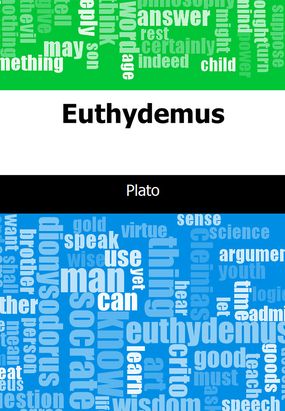
Euthydemus
Euthydemus (Euthydemos), is a discussion between Plato, Socrates and two brothers, Euthydemus and Dionysodorus.
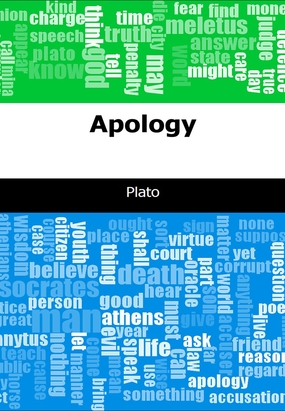
Apology
Apology by Plato is a speech given by Socrates as he tried to defend himself against the charges of being a man "who corrupted the young, did not believe in the gods, and created new deities."
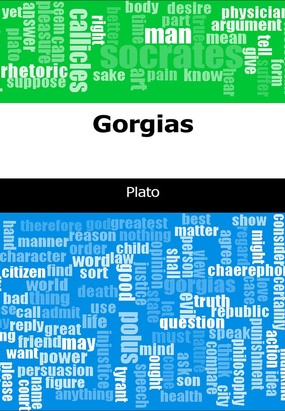
Gorgias
Gorgias by Plato is a discussion between Socrates, Gorgias, Polus and Callicles about the nature of government. This discussion gives insight into how classical Athens was governed.
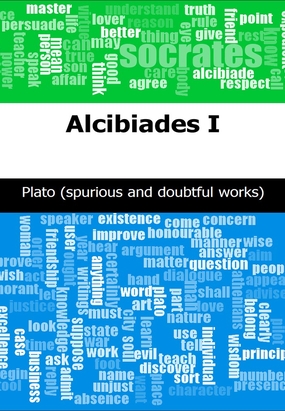
Alcibiades I
Alcibiades I by Plato is a discussion between Socrates and Alcibiades about the corruption of the youth in Athens.
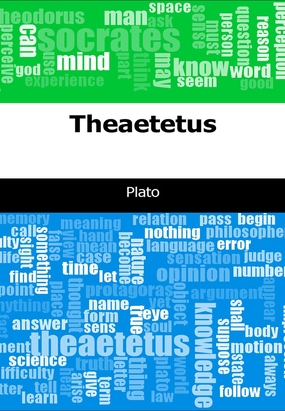
Theaetetus
Theaetetus, the Sophist, and the Statesman are three dialogues by Plato that examine philosophy.Trajectory presents classics of world literature with 21st century features! Our original-text editions include the following visual enhancements to foster a deeper understanding of the work: Word Clouds at the start of each chapter highlight important words. Word, sentence, paragraph counts, and reading time help readers and teachers determine chapter complexity. Co-occurrence graphs depict character-to-character interactions as well character to place interactions. Sentiment indexes identify positive and negative trends in mood within each chapter. Frequency graphs help display the impact this book has had on popular culture since its original date of publication. Use Trajectory analytics to deepen comprehension, to provide a focus for discussions and writing assignments, and to engage new readers with some of the greatest stories ever told."Theaetetus, the Sophist, and the Statesman" are three dialogues by Plato that examine philosophy. "Theaetetus, the Sophist, and the Statesman" are three dialogues by Plato that examine philosophy.
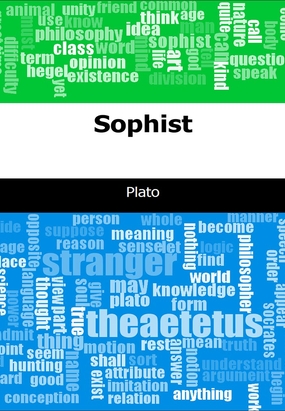
Sophist
The Sophist is a dialogue by Plato examining philosophy that was probably written in 360 BC .
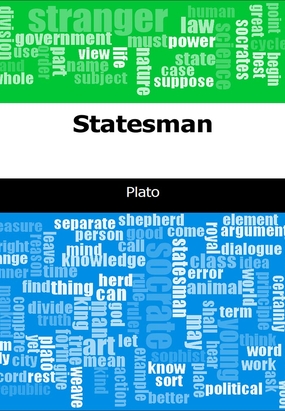
Statesman
The Statesman by Plato is a four part dialogue examining philosophy between Socrates, his student Theodororus, and Young Socrates.